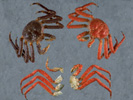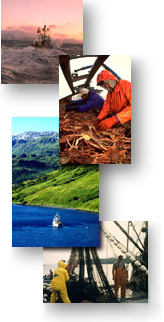|
|
 |
 |
King Crab :: Red King Crab (Paralithodes camtcshatica)
Click on the images to enlarge |
Common names: King crab, Red king crab, blue king crab, golden
crab. Regional names: Alaska king crab, deep water crab, brown crab.
Identification: Four pairs of visible legs and body covered
with sharp thornlike spines. Three pairs prominent spines in the center of the
carapace (red king crab). Two pair prominent spines in the center of the
carapace (blue king crab). Raw crab has red, purple, dark blue, brown or golden
brown shells.
Range: British Columbia to Gulf of Alaska, Aleutian Islands
and Bering Sea to Kurile Islands and Northern Japan.
Season and Catch Methods: Red and Blue Crab: August to
November in the Bering Sea. Golden King Crab: November to March in the Bering
Sea and Aleutian Islands. Caught in pots or traps.
Size: Up to 15 lbs, average 6 to 10 lbs.
Product forms: Fresh: Live; Cooked whole or clusters/sections;
legs; fancy or merus meat. Frozen: Raw or cooked whole; raw or cooked
clusters/sections; legs; fancy or merus meat. Legs are typically graded 9-12,
12-14, 14-16, 16-20 and 20-24 count/10 lbs plus claw and broken leg allowance.
Packaging: Whole cooked crab blast or brine frozen, packed
individually or in 20 to 50 lb cartons. Clusters/sections brine or blast frozen
in 25 to 80 lb baskets and packed in plastic lined boxes. Legs (regular and
pre-scored) packed in 10 to 25 lb cartons. Meat (fancy and merus pack) packed
in 5 lbs blocks.
Nutritional Value (3.5 oz (100 g) raw meat) 86 Kcal, 5.4 Kcal
from Fat, 18 g Protein, 0.6 g Total Fat, 0 g Saturated Fat, 0.3 g Omega-3 Fat,
42 mg Cholesterol, 836 mg Sodium.
|
|




